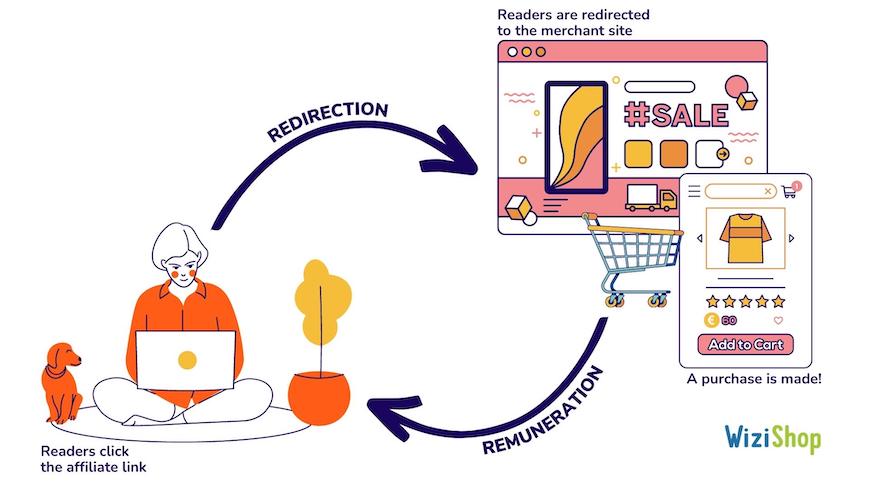Widely used, in particular, by web giants such as Amazon, Cdiscount, Rakuten, or Fnac, affiliate marketing is also accessible and very interesting for independent online stores: this acquisition lever is a fantastic source of income for both e-merchants and affiliate partners. Affiliate marketing is an effective way for companies to promote their products or services using the promotional efforts of affiliates.
If you’re an advertiser or affiliate just starting out, it can be difficult to know how to set up a successful affiliate process. This guide provides a comprehensive overview around affiliate marketing, with tips on choosing the right affiliate programs, creating quality content, promoting products effectively, and tracking performance to optimize your campaigns.
Whether you're an advertiser or an affiliate, you'll find all the basics and best practices to succeed in affiliate marketing in this guide!
What is the affiliate business?
Definition of affiliate marketing
Affiliate marketing is a business model in which a company (called an advertiser) partners with individuals or companies (called affiliates) to promote products or services.
The affiliate earns a commission for each sale or action made through their promotion.
This system is often used online, where the affiliate places links or banner ads on their website or social networks so that visitors can purchase the advertiser's products or services.
The affiliate is paid when a visitor clicks on these links and performs a predefined action, such as a purchase or a newsletter subscription.

Affiliate marketing allows you to delegate the promotion of your products and services to a partner who will be responsible for generating sales on an online store in exchange for a percentage of the sale.
An affiliate marketing program is, in fact, a program through which an ecommerce site offers the promotion of its products and services to partners. This program provides a remuneration, often a fixed-rate commission with a percentage on the sales generated by the affiliates (the partners).
The affiliate system is advantageous for the advertiser, who benefits from an additional promotion without having to pay a fee, and for the affiliate, who can earn money by promoting products or services that are suitable for them.
A better understanding of affiliate networks
It’s important to understand that the concept of affiliate marketing works through three main players: affiliates, sellers, and buyers.
- Affiliate (publisher)
Opinion leader, influencer, or simply ambassador, the affiliate becomes a prescriber of the service or product they promote via their own media (blog, social networks...). They make their recommendations to their audience and are paid a commission on each of the sales they generate.
- Merchant (advertiser)
The seller offers a product or service for sale. They allow a partner (here, the affiliate) to promote their products and services. This exchange is usually done via an affiliate platform or directly via the seller's affiliate program. For each sale, the e-merchant pays a commission to the affiliate.
- Consumer (buyer)
The end buyer relies on the recommendations of their favorite opinion leaders and influencers and acts on their prescriptions. The consumer uses the link provided by the affiliate and purchases the recommended product or service. This generates a sale to the affiliate, who in turn generates a commission from the seller.
As an e-merchant, it’s therefore possible to offer an affiliate program with the aim of recruiting affiliates who will become, over time, solid partners.
However, remember that as an entrepreneur, you can also become an affiliate yourself! All you need to do is to turn to the right sites and platforms.
Affiliate contract
Of course, as an advertiser, any paid collaboration must be supervised.
Before starting any partnership, you’ll have to begin by drawing up a contract that’ll allow you to protect yourself in case of litigation, but also to define the terms of the collaboration in detail.
Here are some essential points to include in your affiliate contract:
- Parties to the contract (seller/affiliate)
- Products and services distributed
- Commission amounts
- Terms of contract termination
The seller is subject to commercial regulations. It’s necessary to be sure that this contract is in order.
Don't panic! If you don't use a platform that automatically generates the contract, a quick Google search can assist you with finding solutions offering legal services to help you prepare this type of document so that you can concentrate on the essentials.
Advantages of affiliate marketing
This business allows advertisers to promote their products or services to a large audience while offering affiliates the opportunity to earn money. Affiliate marketing has various pros and cons for the different actors. Let’s first take a look at the major advantages!
Choice of products
When entering the affiliate market, the best thing to do is to turn to a sector that you know and are passionate about and sell products involving that market.
Affiliate marketing allows you to have an almost infinite choice of products.
It's a fun way to get into ecommerce by selling products that you know and in which you’re specialized. This allows you to create ever more interesting content for buyers but above all to work from your passion.
Inexpensive lever
For the advertiser, affiliate marketing makes it possible to set up an additional promotion lever for the products or services without having to spend a budget as with traditional advertising, and it offers the ability to reach new customers thanks to the affiliates' promotion actions.
The advertiser can also track the performance of the affiliate campaign to measure its effectiveness.
Adaptability to different strategies
Whether it’s through an emailing campaign, influencer marketing and social networks, or thanks to a very successful SEO strategy, affiliate marketing is a commercial concept that can be combined perfectly with all possible marketing levers.
Thus, when you start, you can take advantage of the different acquisition strategies already in place to grow your business. This diversity and flexibility are the strong points of affiliate marketing.
Source of passive income
For the affiliate, it offers the possibility to earn money by promoting products or services for which they’re specialized while being free of their partnerships thanks to the flexibility of the system.
With affiliate marketing, it’s possible to earn money by receiving commissions on each sale generated: a source of passive income that can grow as the partnerships multiply.
For the advertiser, if their affiliate partnerships are working well, then their sales are multiplying.
Attractive commissions
As we’ve seen, the revenue streams can affect all parties involved in an affiliate partnership.
Depending on the type of contract between the affiliate and the advertiser, the commissions can be more or less important depending on the type of sales made.
In any case, the commissions can quickly become interesting for the affiliate if their online work generates more and more traffic. This marketing system is based on volume: the more visitors the affiliate can drive to the advertiser's site, the more they can be rewarded.
Scalable business
The concept of affiliate marketing is also based on a scalable business, that is to say, one that can evolve rapidly by moving up the ranks with a solid marketing strategy.
This business has no real limit: the more content that’s added, the more visitors and sales there will be.
An affiliate who works well with their advertising partners will be able to count on their trust and add a maximum of products to their site.
Affiliate marketing is a sector that offers a lot of commercial opportunities without restraint.
No logistics
The concept of affiliate marketing is based on a partnership between an advertiser and an affiliate, without the affiliate having any stock or logistical action between the customer and the seller.
This system is therefore very practical, as it takes the burden off the affiliate who plays a role in selling the products online without logistics. A great way to start a business without handling or spending resources or energy!
In addition, affiliate marketing is a system that doesn’t require any after-sales service: the affiliate plays the role of a medium between the customer and the seller and lets the seller manage their relationship with their customers.
Disadvantages of affiliate marketing
Affiliate marketing can bring many benefits to businesses and affiliates, but there are also a few downsides to consider.
Affiliate communication
For companies, one of the main drawbacks of affiliate marketing is that they can’t always control how their products or services are promoted by affiliates.
Therefore, there’s a risk that affiliates will use ineffective methods to promote products or services. If they don’t follow the advertiser's rules or promote the products properly, this can have a negative impact on the company's image.
For this reason, it’s advisable for the advertiser to check the sites and means of communication of the affiliates applying to their program to avoid problems.
Advertiser's margin
Poorly managed, affiliate marketing can become costly for companies if they pay high commissions to affiliates.
This can reduce profit margins and make the strategy less profitable.
It’s therefore important to do accurate profitability calculations before launching your program.
Lack of long-term vision
For the affiliate, there’s uncertainty about potential commissions and revenue.
It’s also necessary to create quality content on a regular basis to avoid losing credibility with visitors.
The advertiser can also decide at any time to remove products from their catalog. If you’ve based a strategy on this, you’ll have to start all over again.
Quality affiliate program
To avoid all these disappointments, when you start affiliate marketing, it’s best to turn to specialized solutions in order to create professional campaigns in complete safety.
You should avoid promoting products that don’t correspond to your audience or that aren’t of good quality.
This can lead to a loss of credibility with your audience.
Types of affiliate marketing
It’s important to understand how commissions are calculated and paid before choosing a program.
Cost-per-click (CPC) affiliate marketing
The affiliate is paid for each click on the links or banner ads that they embed in their site or social networks. This can be an interesting solution if the affiliate generates a lot of traffic, but the commissions can be low compared to other types of affiliate marketing.
Cost-per-action (CPA) affiliate marketing
The affiliate is paid for each action performed by the visitors they send to the advertiser's site. This action can be a purchase, a subscription to a newsletter, an application download, etc. The CPA method is often more profitable than the CPC version, because the commissions are calculated according to the amount of actions performed.
Cost-per-impression (CPI) affiliate marketing
The affiliate is paid for each time the banner ad they’ve integrated into their site is displayed to visitors. This can be an advantageous solution for affiliates who have a high traffic site, but the commissions can be low if the conversion rate is low.
Cost-per-thousand (CPM) affiliate marketing
The affiliate is paid for each thousand (mille in French) impressions of the advertising banner that they’ve integrated into their site. This can be an attractive solution for affiliates who have a high-traffic site.
Sponsorship affiliate marketing
The affiliate gets paid for each person they refer to an affiliate program, usually by providing them with a unique referral link. This is for affiliates who have a large network and who can promote affiliate programs effectively.
There are also other types of affiliate marketing, such as cost-per-time (CPT) affiliate marketing, network affiliate programs, recurring affiliate programs, etc.
Each player in the system will have their preference and reasons for choosing one over another. However, you should know that from a management point of view, commission-based compensation wins by far.
Examples of affiliate sites
There are many examples of affiliate sites on the internet, ranging from the blogger's site, to sites that specialize in a single field (for example, fashion or beauty), to general players offering a wide range of product testing.
Here are some examples of popular affiliate sites.
Selectos

Selectos is a comparison site that offers product tests with links to the sellers' sites.
In addition to comparisons, the site offers gift ideas and buying guides. Gardening, high-tech, cooking, sports... Each Selectos niche contains other subcategories.
The strength of this site is that the targeted keywords are very specific and the products are numerous.
Your Dream Coffee

Your Dream Coffee is an affiliate site designed to appeal to coffee enthusiasts of all knowledge levels.
Filled with recipes and blog articles to help readers up their coffee game, this site features real-life product images and personal product recommendations from the author, which help to add authenticity to the reviews.
Not every post on the site includes affiliate links, but the plethora of content available aids in encouraging repeat visits. This also helps to build trust with visitors, making them more likely to click on a link to buy a product in the future.
Wirecutter

Wirecutter is a product recommendation service from The New York Times, providing product reviews for a variety of goods, in categories that include home and garden, health and leisure, tech, baby and kid, style, and gifts.
Each comparison is made up of links to the product pages of the merchant sites.
On Wirecutter, every product is presented in detail, after having undergone rigorous testing by the writers.
ConsumerSearch

ConsumerSearch is another affiliate site that reviews products, including items for the home but also those for fitness/sports, technology, family/pets, and health/beauty.
Here too, each article redirects the visitor to the product links on the merchant sites.
How do you create an affiliate site?
To create a website for affiliate marketing, there are a few steps to complete. By following them, you should be able to create a successful and profitable affiliate site.
1. Find a niche of products to sell
If you start an affiliate business, it’s to sell unique products and to stand out from your competition.
To do this, it’s up to you to determine the most promising niche in your chosen industry.
Research current trends and customer needs to determine popular niches. You can use online solutions to track search trends and popular topics in your area of interest such as Google Trends to track the popularity of keywords in your target area.
Assess your expertise and knowledge to choose a sector where you can add value.
If you’re a cooking expert, for example, you might choose high-end cooking products or organic products. This will help you create unique and quality content about your products. Check out the competition in your market to make sure that there’s enough demand for the products you want to sell, without too much competition.
Research product suppliers for your niche to ensure that you can find quality products at competitive prices. You can contact suppliers to get samples before you start your affiliate business.
2. Choose the Evolup solution for the creation of your affiliate site
In order to start your affiliate adventure, you need to choose a website creation solution. To get started with the best solution on the market, choose Evolup. The concept is simple: Evolup democratizes this lever so that everyone can earn money from their passions thanks to an all-in-one solution!

With Evolup, it’s possible to create your affiliate site quickly and easily, thanks to the support of highly trained artificial intelligence for your business. Product niche, brand name, domain name, slogan and other SEO-optimized texts can be generated in seconds: Evolup's AI will accompany you from the very beginning of your affiliate adventure.
Even better than a single affiliate blog, Evolup makes it possible for you to create an affiliate site, as an ergonomic and fluid online store, suitable for all affiliate programs and 100% compatible with Amazon Associates.
Add all the products you want, link your tracking IDs, and work on your content with AI, all with Evolup's solid foundation in SEO. Your rise in search engines is underway!
Finally, to optimize your online presence and make your website your dedicated showcase for your affiliate partnerships, Evolup will allow you to customize your template as you wish. Your website should reflect the quality of your products and allow you to offer quality partnerships to build long-term relationships with advertisers. Leave no detail to chance with Evolup!
Have a question? Need help? Your team of Business Coaches is at your service to help you on a daily basis. Start your first affiliate site with Evolup and begin generating commissions from $10/month.
3. Choose a domain name for your site
Determine the general topic of your site and make a list of related keywords to define the theme. For example, if you want to create a travel site, you can include keywords like "travel," "destination," "adventure," etc.
Choose a domain name that’s short, easy to remember, and related to your theme.
Avoid domain names that are too long or difficult to spell, as well as those that aren’t related to the subject of your site. Once you’ve chosen a domain name, register it quickly to avoid it being taken by another site.
You can register a domain name with an online domain name registrar.
4. Choose a theme
Customizing your affiliate site is important to set yourself apart from your competition and to offer a site that reflects your image.
In addition, it can help build visitor trust and loyalty to your site, which can result in a higher conversion rate.
Personalization can also allow you to provide a unique user experience and optimal navigation, which can encourage visitors to come back to your site regularly. Personalization can help you effectively target your audience and display the most relevant offers to your buyer persona.
5. Choose an affiliate platform
Choosing a quality affiliate solution means taking into account different aspects of affiliate marketing behind the scenes.
In order to constantly improve your business and offer the best products to consumers, an effective affiliate marketing solution will allow you to track clicks, centralize statistics and analyses related to your site, but also offer you qualitative partnerships.
Affiliate platforms will therefore offer you a great support to develop your business.
Evaluate the different features of affiliate solutions to make sure they meet your needs in terms of performance tracking, affiliate management, commission payments, etc. You can also compare different pricing models to find a solution that fits your budget.
Test the different affiliate solutions to evaluate the quality of their services and make sure that a quality advertiser is offering products in your theme.
It’s not enough to sell online; you’ll also have to get a concrete idea of the ease of use of the solution, the quality of their support, and the reliability of their services.
Consider user reviews and testimonials to evaluate the quality of different affiliate solutions. You can check reviews on search engines, discussion forums, or specialized platforms to get accurate information.
As an advertiser, it’s entirely possible for you to manage your affiliate program with your own system. However, affiliate platforms have a number of positive points, especially when you’re just starting out.
In terms of time, resources, and visibility management, here are some popular affiliate platforms: Effinity, Affilae, Casaneo by arkheus, Kawanko, Awin, etc.
6. Integrate links and banners into your site
It’s important to integrate affiliate links and banners strategically into your site to maximize conversions.
For example, you can integrate them into pages that have a high conversion rate, like product pages or landing pages.
You can also integrate them into blog posts relevant to the product that you’re promoting.
As you can see, one of the most important levers in affiliate marketing will be the SEO of your pages in order to reach as many visitors and potential customers as possible.
Thanks to a carefully crafted SEO strategy, your pages will be able to climb the rankings on search engines like Google to make the articles with your affiliate links appear in the top results. It’s then up to you to optimize your pages to make the offers appear in the best way to encourage clicks and conversions!
Never forget: for your affiliate business to work, you must be transparent about the system. Your visitors who will click on the product links must be informed that you’re using the affiliate system and that they’ll therefore be redirected to the seller's site.
This transparency will allow you to build a long-term relationship of trust with your visitors and prevent any disappointment or negative review concerning your site because of an unfortunate oversight...
How do you succeed with your affiliate business?
Although having an affiliate business can be very lucrative, it takes some expertise and perseverance to succeed in being able to make money with affiliate marketing.
If you want toI get started in this activity and give yourself every chance of success, here are some affiliate marketing tips.
Choose quality products/services
As in traditional ecommerce, it’s important to choose quality products for your affiliate site. This can help build trust and loyalty of visitors to your site and improve the user experience.
To choose quality products, you can read up on user reviews and opinions, read product warranties and return policies, and check the reputation of the company that offers them. You can also try the products yourself to make sure that they meet your quality expectations. Always select products that are related to the theme of your site to avoid disappointing visitors.
Share your expertise
Creating engaging content around your site can be an effective way to attract, retain, and build trust with visitors. For example, you can write blog posts on topics related to your products, share user testimonials, offer tips and tricks on your topic, or provide exclusive content to your followers.
You can also promote your content on social networks to help it spread and reach a wider audience. Don't forget to solicit comments and feedback from users to constantly improve your content. The goal will be to make your site and your offers known: diversify the visibility channels to achieve this!
Use different marketing levers
Using different marketing levers to promote your affiliate site and achieve your business goals is a good affiliate strategy. You can avail of online advertising to target users who have similar interests to your products and encourage them to visit your site.
In addition, you can use social networks to communicate with your audience and share interesting content from your blog for example. Email marketing to build loyalty among your subscribers and encourage them to buy the products you promote is very effective in affiliate marketing. Finally, SEO is an almost indispensable lever to ensure long-term sustainability.
Track your performance and optimize your site
In order to know if your actions are well executed, you’ll need to track the performance of your affiliate site and optimize it regularly to reach your business goals. Analysis tools to track your site's key performance indicators (KPIs) exist to monitor the conversion rate, the bounce rate, and the time spent on the site.
These indicators will allow you to measure the effectiveness of your site and detect optimization opportunities. Targeting your audience more effectively, refining your ad messages, or testing different banner formats and placements: do tests to understand which levers to improve.
On the advertiser's side: how do you offer affiliate marketing?
Keep in mind that as a vendor, any affiliate program will have to meet, first and foremost, commercial regulations. Contracts are tedious, but affiliate platforms will usually take care of drafting them.
Blogs, influencers, partnerships: recruiting
Recruitment is one of the founding pillars of your affiliate program. Choosing your target, determining the target audience to which you want to offer your products, and selecting influencers who are aligned with your brand are all tasks that you’ll have to carry out.
Your affiliate program may be the best in your industry, but if you don't properly target the affiliates you want, you may be headed for failure.
Here are some of the channels you can use to target the affiliates you wish to attract:
- affiliate platforms,
- social networks and forums,
- newsletters, and
- your own website.
Build a relationship of trust and loyalty
Once you’ve built your affiliate network, you’ll need to retain them. Identifying the best affiliates is critical to your business.
These affiliates are the ones you'll need to protect throughout the life of your business if you want to work with them over the long term. Here's how to identify your best affiliates:
- those with the highest volume (of sales or leads depending on the solution you choose),
- those who bring the most qualified leads, or
- those who have a large enough audience to help you promote your offers.
Once you’ve identified these affiliates, establish a relationship of trust with, for example, regular privileged contacts, to exchange and collect their opinions about products or possible improvements for your store.
Of course, identifying your best affiliates doesn’t mean that you should forget about all the others. Quite the contrary!
An affiliate with modest results today can only progress, and for that, it’s up to you to encourage them. Keep in touch with them, send regular newsletters, and motivate them to take the next step!
As you can see, affiliate marketing has many advantages for both the e-merchant and the affiliate.
Affiliate marketing is a real revolution in the world of online commerce, because this system doesn’t require any logistics, which makes the technique accessible to everyone! Affiliate marketing provides the opportunity to earn money by promoting products that the affiliate is passionate about: it’s a way to achieve in an exciting world while earning money.
Compared to ecommerce or even dropshipping, the entrepreneur who wants to start an affiliate business will be able to develop their activity without any stock, without any after-sales service to manage, but simply by recommending products to consumers. It’s a major opportunity to create long-lasting relationships with their engaged communities!
On the advertiser's side, affiliate marketing is a way to promote their own products without having to pay high fees like in traditional advertising. It also allows you to reach additional customers and new qualified targets.
It’s possible to considerably enlarge your audience and increase your sales at the same time if you select your affiliates wisely and establish a true long-term partnership for the benefit of all parties involved, regardless of your industry.
Diversify your traffic sources and acquisition channels and turn SEO on Google or Facebook Ads into real earnings with a pay-per-performance system and quickly collected money.
Start your new life as an entrepreneur, as an advertiser, or as an affiliate without delay!
Create your affiliate store - 7-day free trial

![Affiliate marketing: Complete guide to getting started! [2025 Edition]](https://wizishop.com/media/6437d0dcda6b5a347326ebdb/v1/affiliate-marketing-guide.jpg)




